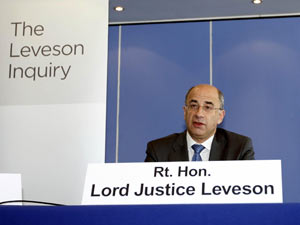|
The Leveson inquiry is finally approaching the halfway mark - or
end of part one if you prefer. The evidence, which we've
been hearing sinceNovember, has brought us some gems.
 |
|
Sean Dempsey, PA Wire |
There were genuine cringeworthy moments for David Cameron over the
syrupy texts of support from former editor of The Sun
Rebekah Brooks.
We heard from head of the News Corp empire Rupert Murdoch and
editor-in-chief of the Daily Mail Paul Dacre. Then there
was Hugh Grant, Charlotte Church, Anne Diamond, and Paul
and Sheryl Gascoigne.
A man was sacked from his role as special adviser for doing his job
while Jeremy Hunt, the Culture Secretary, kept his.
As the cost crawls towards the £4m marker over the next month,
Leveson will be considering the future for press
regulation; namely it needs some and the current system
of "self-regulation" is not working.
By autumn he is expected to make his recommendation. The final
decision is for the politicians. But this is only the
halfway stage. There's more to come: part two is the
specifics of hacking at News International and the
failed police investigation.
The catalyst for the inquiry was a story in The Guardian that a
News of the World employee had hacked and then deleted
messages on the mobile of the murdered schoolgirl Milly
Dowler. It has since transpired that while the phone was
hacked by Glenn Mulcaire, he did not erase the
voicemails.
So as the inquiry draws towards half time, we ask: is the Leveson
inquiry getting anywhere and is it worthwhile?
Yes:
The inquiry has already encouraged the media to take a
good look at the system as it stands and find it wanting
 |
|
Steve Vaughan |
Forget the fact that Steve Coogan didn't want to be famous, Rebekah
Brooks rode a police horse called Raisa and enjoyed an,
as yet not-quite-defined "country supper" with David
Cameron. While the celebrity and chum-ocracy nonsense is
entertaining, it hardly makes a big, fat judicial
inquiry feel worth the £3 million we are paying for it.
But look at the evidence of Sally and Bob Dowler, Kate and Gerry
McCann, and Margaret and James Watson, and you will see
why the Leveson Inquiry is a) a good thing and b)
already getting somewhere.
Because it is the ordinary people that will drag this inquiry up by
its bootstraps. While I'm very sorry if Coogan, Grant et
al feel aggrieved by press coverage, they can at least
afford to sue, which does act as a bit of a curb. When
something bad happens to your ordinary family, well, as
Gerry McCann put it: "it's open season".
The Press Complaints Commission (PCC) - the status quo and in
effect, journalists sitting in judgement on journalists
- has a good set of standards just no really effective
sanctions for those falling foul of them. The PPC's
biggest punishment is to force a printed apology. Legal
redress under defamation or privacy law is well outside
the budget of most.
And while most people are aware that the press have some fairly
unsavoury practices, the inquiry has thrown them into
sharp relief: the moving evidence from Sally Dowler
about being afraid to open her front door because of the
journalists' questions, in the wake of her daughter's
murder; Margaret and James Watson, who spoke about the
suicide of their teenage son because he could no longer
stand negative news stories about his murdered sister -
he hanged himself clutching a fistful of newspaper
clippings. The PCC did not help them. It took Sheryl
Gascoigne to point out that the industry's regulatory
body is regarded as a "waste of time".
The inquiry has already encouraged the media to take a good look at
the system as it stands and find it wanting. Their
submissions to the inquiry are tougher, include powers
of investigation, fines, codes of conduct, contracts,
advertising bans. They've been as tough as they can be
in the hope it will stop Leveson passing a law that will
force them to stick to a set of rules he will decide.
And, while inquiry by a committee of MPs might be a darn sight
cheaper, it would feel like an unhappy parliamentary
interference. A state suggesting restrictive standards
for its commercial media runs the risk of accusations of
censorship. A judicial inquiry is the only thing that
would win industry respect and support.
In some ways Leveson is already working, the airing of embarrassing
chumminess between our politicians and the press - who
knew? - must surely have cut the number of country, town
or city suppers on offer. The police have surely
reviewed its horse-loaning policy.
Leveson might seem like a silly, unnecessary show trial, but for
the ordinary people, it's a hope for a free but fairer
press.
No: Judge-led inquiries are supposed to be confined to
matters of vital public importance
 |
|
Zoe Vaughan |
Judicial-led inquiries are really becoming the new black. Everyone
wants one. And why the hell not? It's a win:win call for
political leaders. You call for one and you score one
political point for looking like you're doing something.
You grant one and you score one political point for the
same reason.
The loser? The people who foot the bill; these things don't come
cheap - around £1m per quarter actually - and in March,
Leveson was already knocking on the door of £3m.
Judge-led inquiries are supposed to be "confined to matters of
vital public importance concerning which there is
something of a nationwide crisis of confidence." I'm not
sure phone hacking quite matches Bloody Sunday for
gravity.
I'm also of the Ian Hislop persuasion. Phone hacking, police taking
money for information, harassment, libel, are all
illegal. Admittedly it's all rather sprawling and could
perhaps be dealt with better by a special
purpose-convened court, rather than getting lost in the
achingly slow general purpose courts.
But really, do we need the judiciary to listen to hours of
celebrity guff when most of the shortcomings are obvious
and could be dealt with by cheaper select committee?
Leveson has become a tiresome who's who for media
wannabes with editors from the Heydon Daily Packet
turning up to say nothing of any use; they are only
there to get their "I spoke at Leveson" t-shirts. All
the while the cost goes up as fast as News International
shares go down.
The result of Leveson will be that the industry needs a tough
regulatory body that can investigate and fine. The dogs
in the street could tell you that. The financial
regulator fined Barclays £291m, the Press Complaints
Commission forces people to say sorry in print.
Leveson only recommends and given his keenness to get the press to
submit their proposals for improved "self-regulation" it
feels unlikely he will be looking to lay down a Leveson
law.
It will be the politicians who decide and parliament will be
reluctant to interfere too heavy-handedly. Newspapers
have a history of being partisan and it is a brave
politician who takes on the editors. They will also
surely want to avoid getting stuck in the raspberry jam
that is our privacy laws.
Leveson feels like an expensive knee-jerk reaction to a phone
hacking story that in the end, it has turned out, is not
even wholly true. Oh the irony. |




